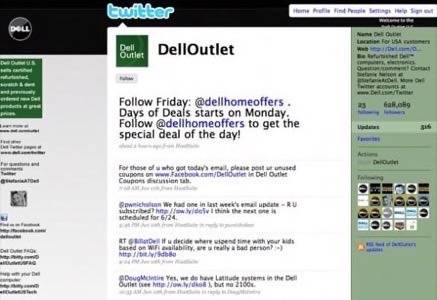Dell Computers announced last night that it has surpassed $3 million in sales via links from one of its Twitter accounts, making one of the most high profile examples of social media Return on Investment (ROI) all the more juicy.

Telling your reluctant boss that social media is worth using because Dell made $3 million on Twitter, however, runs the risk of encouraging e-commerce broadcast as the model for engagement in conversation. Other, more conversational, examples of ROI make important additions to conversations about Dell and social media. (They also concern a lot more money.)

The @DellOutlet account has more than 600k followers on Twitter and frequently posts links to discounted computer hardware. Revenue from those links is great to be able to point to, but there is a risk of reinforcing traditional business thinking where it is not fully appropriate. New media is a new world and while the ultimate bottom line is important, many participants argue that the greatest benefits of engagement do not draw a straight line to the cash register. Building a strong community of customer advocates, listening to community concerns and discovering new business and product developement opportunities are softer benefits of social media engagement that skeptics often don’t see when they presume that old-school methods of pushing calls to buy is what should be done on these new channels.
Hard and soft ROI are matters we focused on extensively in the ReadWriteWeb Guide to Online Community Management, our first premium report for businesses.
Dell itself does a lot of listening and conversation from this same Twitter account. The public benefits of that conversation have been all but lost now that Twitter has changed its policies regarding the visibility of public @replies. Dell followers no longer see public replies sent to other followers they themselves aren’t following. That’s a major lost opportunity for public education and good will.
As Pandora community manager, Lucia Willow, told us in an interview for the Guide: “I intentionally respond to most customer service messages with private direct messages. If it’s a question that a lot of people have, then I answer back publicly with an @ message.”
Shhh…those public conversations are now invisible, for Pandora, for Dell and for all the rest of us. Though Dell reports good results from Twitter over the last two years, changed policies over the last two months may require a change in the way the company uses Twitter if it wants to keep seeing those kinds of results.
Four Better Examples of Social Media ROI
That Dell has made $3m from Twitter links is cool, and it’s a good arrow to have in your social media advocacy quiver, but here are a number of examples we think better capture both the bottom line and some of the soft benefits of conversation. Joe Cothrel, Chief Community Officer at enterprise online community vendor Lithium, gathered these numbers in 2007 and we included them among other resources in the RWW Community Management Guide.
These examples reference older related forms of online social interaction, but they also concern far greater sums of money than $3m.
- A Cisco study in 2004 found that 43% of visits to online support forum are in lieu of opening up a support case through standard methods.
- Cost per interaction in customer support averages $12 via the contact center versus $0.25 via self-service options. (Forrester, 2006)
- Jupiter Research (now Forrester) reported in 2006 that customers report good experiences in forums more than twice as often as they do via calls or mail.
- Ebay found in 2006 that participants in online communities spend 54% more than non-community users.
Better customer experiences, far lower support costs and more buying activity in the long run. Those are observations that can help provide context to the high-profile example of Dell pushing e-commerce links out over Twitter. Dell is clearly doing a lot of the same kind of customer service via social media that the companies above cite, but watch out for falling into the trap of telling your reluctant boss that Twitter is important because Dell bagged $3 million there.
Thanks to Ben Parr for sharing the Dell Community announcement link.

















